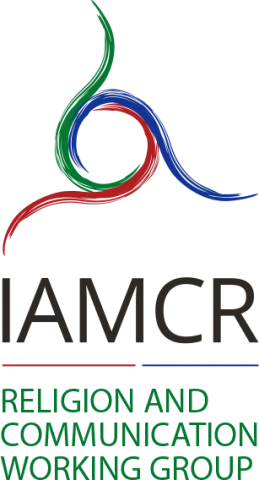
The Religion & Communication Working Group of the International Association for Media and Communication Research (IAMCR) invites the submission of proposals for papers and panels for IAMCR 2022, which will be held online from 11 to 15 July 2022. The conference will also have a national hub at Tsinghua University in Beijing. The deadline for submission is 9 February 2022, at 23.59 UTC.
See the CfPs of all sections and working groups >
Conference Themes
IAMCR conferences have a main conference theme (with several sub-themes) that is explored from multiple perspectives throughout the conference in plenaries, in the programmes of our sections and working groups, and in the Flow34 virtual cinema and podcasts stream. They also have many themes defined by our 33 thematic sections and working groups. Proposals submitted to sections and working groups may be centered on an aspect of the main conference theme as it relates to the central concerns of the section or working group, or they may address the additional themes identified by the section or working group in their individual calls for proposals.
The main theme for IAMCR 2022, “Communication Research in the Era of Neo-Globalisation: Reorientations, Challenges and Changing Contexts,” is concerned with possibilities for rethinking communication research agendas in the post-pandemic world, which has seen dramatic shifts in the way we interact and understand our physical, social, cultural, political and material environments.
Eight sub-themes of this central theme have been identified: Reorienting Media and Communication Research in the Era of Neo-Globalisation; Artificial Intelligence in Global Communication Contexts; Cultural Identities and Dis-Identities in the Era of Neo-Globalisation; Communication for Sustainability: Climate Change, Environment, and Health; Media Ethics and Principles in the Digital Age; Media, Communication, and the Construction of Global Public Health; Data/Digital Science and Intercultural Communication; Digital Platforms and Public Service: Science, Technology and Sustainability. See the complete theme description and rationale here.
The broad conference theme has direct implications for the study of Religion and Spirituality, with ramifications for the academic study of media and religion: COVID-19 has impacted upon the spiritual and religious environments. Victims and families of COVID-19 reach out for spiritual comfort - including to the mass media and social media. Papers discussing the media portrayal of religion, spirituality, death and suffering in the media during the Pandemic will be welcome. So will papers assessing the question of the impact of Religion upon media ethics during the pandemic. With social distancing closing physical religious structures, and prayer services being transferred to Zoom religious services, media technology today plays an important role in religious life. With restrictions of Freedom of Religion and Belief -- including festive lifestyle events such as funerals, and pilgrimages to sacred places - all this impacts religious identity.
But papers across the broad spectrum of research on the relationship of religion, media and communication, beyond the conference theme, are equally encouraged. There is hardly an established canon of research in this wide field of religion, communication, and culture, although some nuclei in the current research agenda can be identified. These include:
- Images of religion in mass media; news coverage of religion.
- Religious communities and the media.
- Impact of media on religious practices whether personal or institutional.
- Theological approaches to the mass media.
- New media and religion.
- The emergences of the religious according to new mediatic conditions.
- Film and religion.
- Religious media.
- Religious public relations.
- The specificity of communication practices in religions given their singular content and claims.
- Religious communication processes.
- Media expression of faith and spirituality.
- Re-interpretation of religion in the digital media context
- Examination of oral religious ancient communication, scriptures in a digital context
- Religious communication experiences, religious miracles in the current media explosion
- Ancient religious communication theories
- Communication theories and religion
Theoretical, methodological, empirical - all approaches are welcome for proposed papers, provided they offer good quality and interesting, novel perspectives in their respective methodological nature.
Guidelines for abstracts
Abstracts are requested for the Online Conference Papers component. Abstracts submitted to the Religion & Communication Working Group should have between 300 and 500 words and must be submitted online at https://iamcr2022.exordo.com. Abstracts submitted by email will not be accepted.
The deadline to submit abstracts is 9 February 2022 at 23h59 UTC.
See important dates and deadlines to keep in mind
It is expected that authors will submit only one (1) abstract. However, under no circumstances should there be more than two (2) abstracts bearing the name of the same author, either individually or as first author. No more than one 1 abstract can be submitted by an author to the Religion & Communication Working Group. Please note also that the same abstract or another version with minor variations in title or content must not be submitted to more than one section or working group. Any such submissions will be deemed to be in breach of the conference guidelines and will be rejected.
Proposals are accepted for both single Papers and for Panels with several papers (in which you propose multiple papers that address a single theme). Please note that there are special procedures for submitting panel proposals.
Submitted abstracts will generally be evaluated on the basis of:
- Theoretical contribution
- Methods
- Quality of writing
- Literature review
- Relevance of the proposal to the work of the Religion and Communication Working Group
- Originality and/or significance
Languages
The Religion & Communication Working Group accepts abstracts in English.
For further information about the conference contact beijing2022@iamcr.org
For further information about the Religion & Communication Working Group, its themes, submissions, and panels please contact:
Convenor: (Prof) Binod Agrawal
Manipal Academy of Higher Education, India
agrawal.binod.c@gmail.com
Co-Convenor: (Prof Emeritus) Yoel Cohen
School of Communication, Ariel University, Israel
prof.yoelcohen@gmail.com
Vice-Convenor: (Prof) Miriam Diez Bosch
Blanquerna Observatory on Media, Religion & Culture
Ramon Llull University, Barcelona, Spain
MiriamDB@blanquerna.url.edu